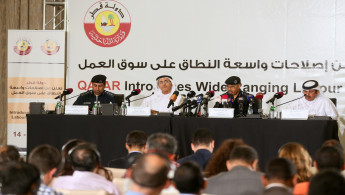Qatar finalising new sponsorship law for foreign workers
A Qatari official revealed Sunday that the law regulating the entry and exit of expatriates in Qatar, which the government plans to issue as a replacement for the currently applied Sponsorship Law, is close to implementation. The new law is expected to be issued officially in the next few weeks.
Ali bin Samikh al-Marri, Chairman of Qatar's National Human Rights Committee (NHRC), said the Committee had reviewed the planned law and presented its remarks and recommendations. "The new law will balance the rights of the sponsor and the sponsored, it will act as a safeguard for everyone, and guarantee more rights and liberties", he added.
The Qatari Minister of Labour and Social Affairs, Abdullah bin Saleh al-Khulaifi, confirmed a few days ago that the amendments to the new labour law had been finalised, and that the law was ready to be issued in conjunction with the amended sponsorship law, which had been prepared by the Interior Ministry.
| The sponsorship system will be replaced with one based on contracts signed between workers and their employers. |
Khulaifi said the amendments to the labour law guaranteed the workers' financial rights by requiring the transfer of foreign worker's salaries to their bank accounts at the end of every month.
Last May, Doha officially announced the end of the current sponsorship system, replacing it with a new one based on contracts signed between workers and their employers. The current exit permit system, which requires permission from the employer before an employee can leave the country, will also be cancelled and replaced by a new electronic system managed by the Interior Ministry. Employers who withhold their employees' passports will be subject to a fine of nearly $15,000.
Both the Interior and Labour Ministries have confirmed that Qatar has begun a series of wide ranging reforms in the job market to guarantee the workers' rights and improve their standard of living and working conditions in the country, in compliance with Qatar's National Vision 2030.
Brigadier General Mohammad al-Atiq, Deputy Manager of the Borders and Passports Department, said the No Objection Certificates (NOCs) previously required by the Ministry of Interior to regulate the transfer of employees from one employer to another would be replaced by work contracts. He explained that if a contract specified a set period of time, the employee can change jobs at the end of that period, "and if the contract does not set an end date, the employee can change jobs after 5 years without a permission from his or her employer."
This is an edited translation from our Arabic edition.





 Follow the Middle East's top stories in English at The New Arab on Google News
Follow the Middle East's top stories in English at The New Arab on Google News
![Israeli forces ordered bombed Gaza's Jabalia, ordering residents to leave [Getty]](/sites/default/files/styles/image_330x185/public/2176418030.jpeg?h=a5f2f23a&itok=_YGZaP1z)

